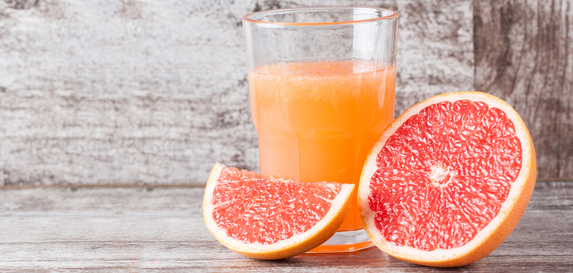
Fruit juice can be a refreshing and nutritious part of your diet. However, certain compounds in grapefruit and other juices could work against cancer therapies.
Natural doesn't always equal safe, notes Mary Paine, a registered pharmacist and Assistant Professor at the University of North Carolina at Chapel Hill, N.C. Case in point—decades ago, researchers discovered grapefruit juice has compounds called furanocoumarins. These organic chemical compounds have been known to interact with certain medications in ways that could be dangerous.
How Furanocoumarins in Grapefruit Can Affect Cancer Medications
When medications enter our system, the body registers them as foreign substances and clears them away via enzymes called cytochromes. An example of this is the enzyme CYP3A4, which breaks down some oral medications, limiting large amounts of the medication from reaching the bloodstream.
Thus, when cancer therapies are developed, this process is taken into account. The dosage of a particular medication is also determined by taking into account the body will break it down in a certain way.
Furanocoumarins block CYP3A4 in the intestine, preventing the enzyme from breaking down some anticancer agents. If CYP3A4 can’t work, too much medication might reach the bloodstream, and a normal dose could quickly become a toxic overdose. In the case of tyrosine kinase inhibitors, high levels could cause a heart rhythm to become so erratic that blood can no longer be pumped effectively through the body—causing cardiac arrest in some instances.
To be sure furanocoumarins are the cause, studies were conducted to look at responses when the compound wasn’t present. Tests showed furanocoumarin-free grapefruit juice didn’t result in high concentration levels of the CYP3A4 drug substrate felodipine. This helped to conclude furanocoumarines were the contributing factor that blocked CYP3A4.
David Bailey, a clinical pharmacologist at the Lawson Health Research Institute and Professor Emeritus at the University Western of Ontario, discovered this drug-food interaction. Since that time, Dr. Bailey has also discovered grapefruit juice and other juices can also have the opposite reaction. The active ingredient naringin can block absorption of some medications, reducing their potential benefit.
He, and others in the medical community, have emphasized the need for healthcare providers to discuss this issue with patients before they take a medication that may interact with grapefruit juice.
Fruits With Furanocoumarins and the Therapies They Effect
To date, orange juice and apple juice have also been shown to act like grapefruit juice in blocking the absorption of some drugs, even though they don’t contain naringin.
The presence of furanocoumarins has been discovered in other fruits as well. Fruit with furanocoumarins include: pomelos (a cousin of grapefruits), limes and Seville oranges.
Since furanocoumarins were first studied in 1998, dozens of prescription drugs and cancer therapies have been developed. Many of them have the potential to react with grapefruit juice.
Some anticancer agents that could react negatively with grapefruit juice include:
- Afinitor (everolimus)
- Caprelsa (vandetanib)
- Cyclophosphamide
- Gleevec (imatinib)
- Nexavar (sorafenib)
- Sprycel (dasatinib)
- Sutent (sunitinib)
- Tarceva (erlotinib)
- Tasigna (nilotinib)
- Tykerb (lapatinib)
- Votrient (pazopanib)
- Xalkori (crizotinib)
- Zelboraf (vemurafenib)
As this is not a comprehensive list of anticancer drugs that could interact with grapefruit juice, you’ll want to talk with your doctor about your particular therapy.
The Potential Upside of Grapefruit Juice
There could be an upside to such interactions, however. One group of researchers is examining how to turn the negative effect of grapefruit juice into a positive one by mixing grapefruit juice with susceptible anticancer agents. By deliberately raising the absorption rate of a drug, the dose could be lowered and still be effective.
Taking less medication could ease gastrointestinal side effects and may make therapies less expensive, says Ezra Cohen, a Professor of Medicine at the University of California San Diego. Cohen’s team recently published preliminary results of such an effort in the journal Clinical Cancer Research.
In the study, one group of people with incurable cancer drank a glass of grapefruit juice with Rapamune (sirolimus), an oral medication approved by the Food and Drug Administration to prevent rejection of organ transplantations. (The drug is not approved for cancer treatment.) The grapefruit juice boosted blood levels of Rapamune by 350%. Cohen’s group is working to extend their findings to larger trials.
But Dr. Bailey expresses concern that mixing grapefruit juice in such a manner would likely make blood levels of anticancer agents unpredictable, and there’s currently no simple test to forecast the intended response beforehand.
"It’s not that grapefruit and related fruits or the interacting drugs are bad," Dr. Bailey says. "It's all about the circumstances of use. Although these adverse interactions may occur in low frequency in the patient population, which we don’t currently know, the consequences [can be] dire and easily preventable. Caution is by far the wisest approach."
Medications must now have a warning on the label if there’s a possibility of reaction with grapefruit or other juices. It’s also important to discuss the potential side effects and risks of all therapies with your doctor prior to taking them.
